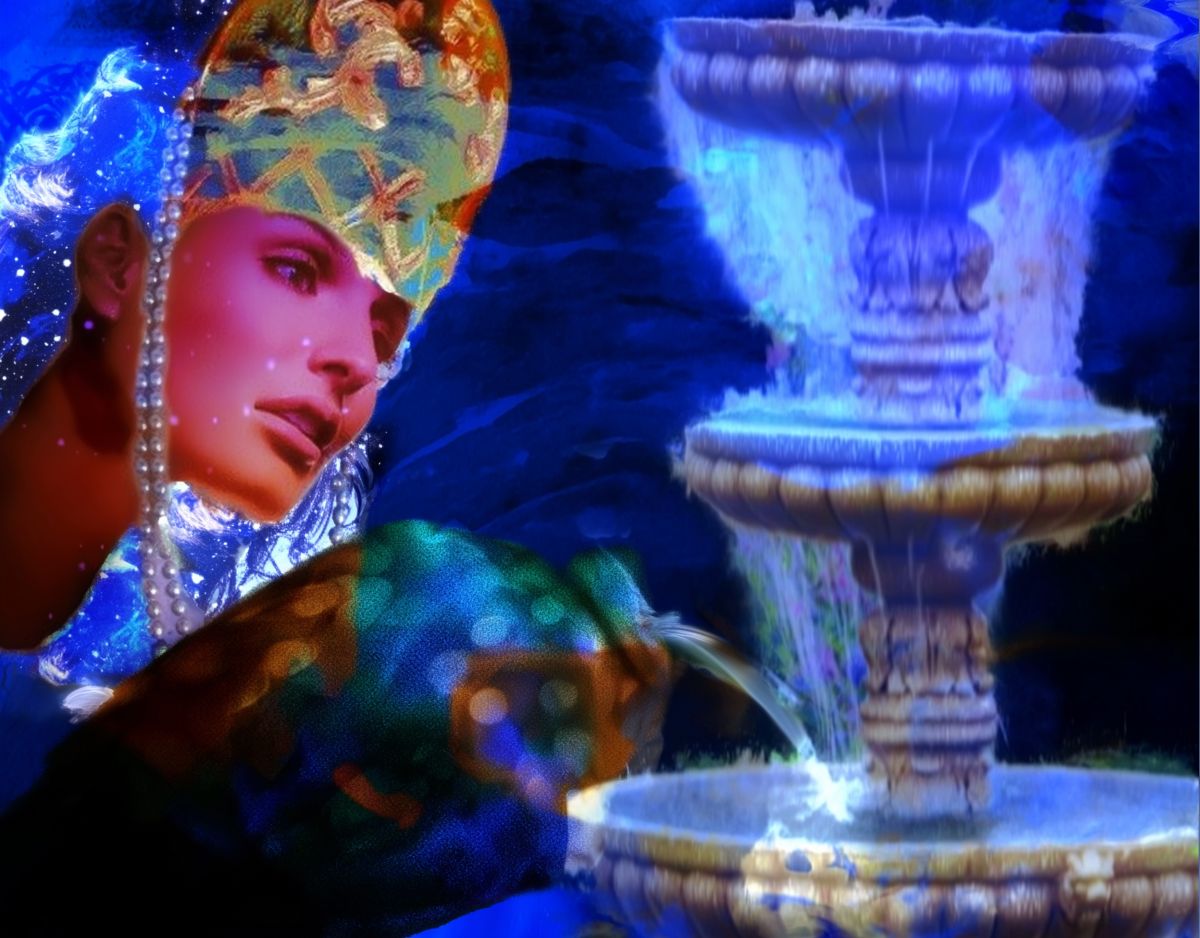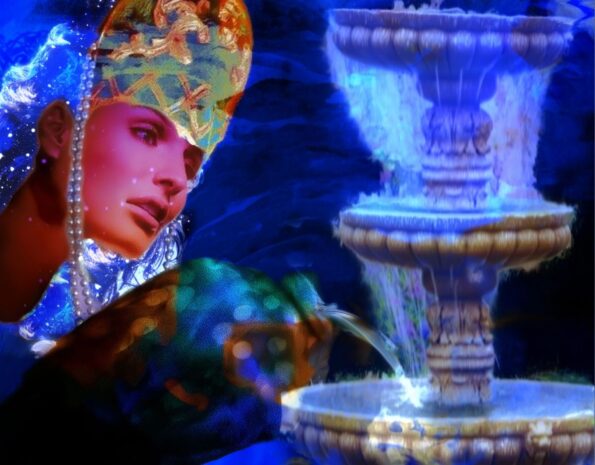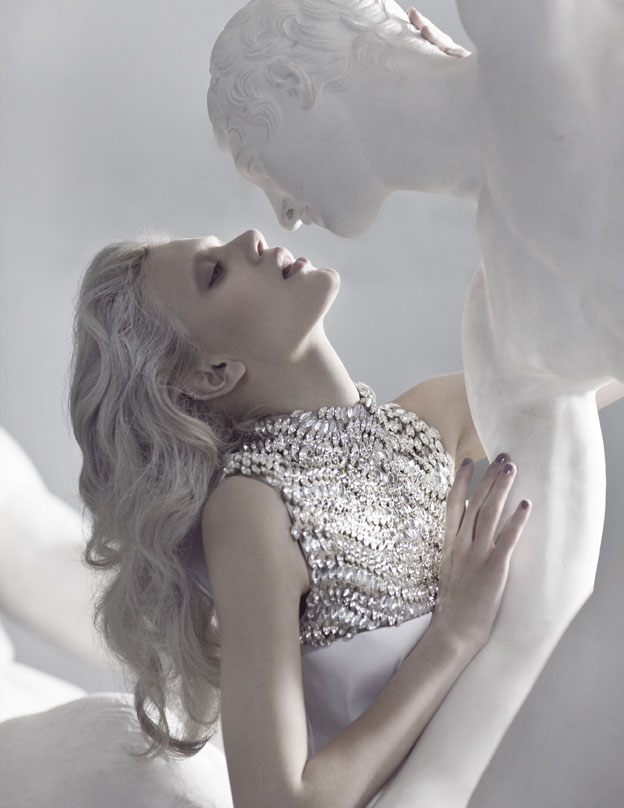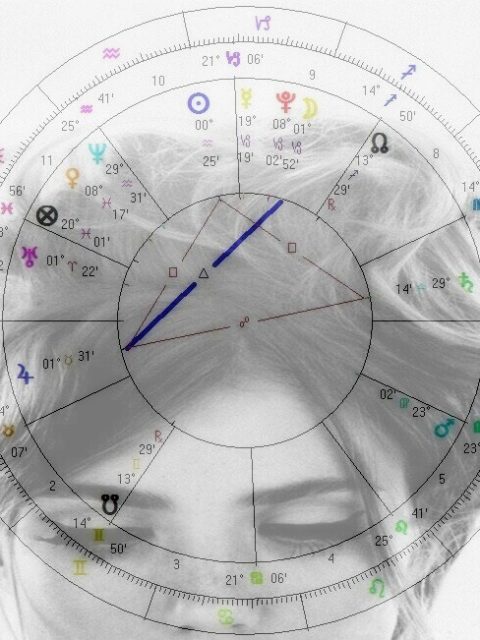
The Contents of Aquarius’ Jug
 A jug, ordinarily, is the sort of thing you might find atop a rustic kitchen table, filled with milk or water, innocuous and earthly. But in the hands of Aquarius, this jug becomes something else entirely—it morphs into a conduit, a sort of spiritual watering can meant not for flowers, but for awakening minds. Aquarius is an air sign, of course—a fact that seems to contradict its signature image of water pouring forth in graceful arcs. But therein lies the first layer of mystery, the paradox of the universe. The water isn’t water. It’s not wet. It’s not heavy. It’s not bound by gravity. It is thought, it is awareness, it is vision decanted from the great pitcher of the infinite. What is being poured is insight, unconfined and uncommodified, sweeping across consciousness.
A jug, ordinarily, is the sort of thing you might find atop a rustic kitchen table, filled with milk or water, innocuous and earthly. But in the hands of Aquarius, this jug becomes something else entirely—it morphs into a conduit, a sort of spiritual watering can meant not for flowers, but for awakening minds. Aquarius is an air sign, of course—a fact that seems to contradict its signature image of water pouring forth in graceful arcs. But therein lies the first layer of mystery, the paradox of the universe. The water isn’t water. It’s not wet. It’s not heavy. It’s not bound by gravity. It is thought, it is awareness, it is vision decanted from the great pitcher of the infinite. What is being poured is insight, unconfined and uncommodified, sweeping across consciousness.
The jug, in this symbolic landscape is as a symbol of responsibility—the duty of Aquarius to carry, protect, and ultimately share what it holds. Aquarius doesn’t clutch this jug for personal enrichment or the hoarding of secrets. This bearer moves through life with an open palm and an outstretched arm. The jug is tilted, always mid-pour, spilling its contents with a purpose. It’s about dissemination—the spreading of ideas, ideals, and dreams. And what of the water itself, this metaphorical elixir? It is the stuff of revolutions. It represents the flow of the new, the uncomfortable, the electric buzz of a better world imagined in the minds of those brave enough to challenge the structures of the old. Aquarius pours the future into the present, flooding it with questions we might not yet know how to answer.
In this way, the jug is a contradiction. It is a finite shape holding something infinite. It is an object, but it holds a force—fluid and formless—that cannot be truly owned or contained. It is the vessel of those who think differently, who love humanity in its flawed entirety, and who dream of elevation. So when you picture Aquarius, don’t see a figure pouring water. See a being channeling consciousness.
The jug may carry knowledge and a kind of numinous ether, an unfiltered universal energy. The electric charge that sparks revolutions and rends the veil of accepted reality. This is star-stuff, concentrated and swirling in the jug, waiting to be released. When we say that Aquarius pours this energy, it’s more akin to opening a portal. What emerges isn’t always comfortable or easy. It’s volatile, transformative, sometimes even chaotic. And that’s the point. This sign brings change with a jolt. The jug is a lightning rod, a channel, a divine disruptor. This ethereal substance, this cosmic goo of potential and provocation, serves to challenge. It doesn’t ask permission. It seeps into minds and cultures and systems, suggesting new paradigms and perspectives that were previously unthinkable. This is why Aquarius is so often linked with the archetype of the outsider, the innovator, the visionary crackpot who sees further because they are willing to look where others won’t. They hold the jug because they’ve proven they can bear the burden of newness, of strangeness, of untested possibility.
And so, as this new energy is poured, what happens? The world shifts—subtly at first, then unmistakably. People begin to ask questions they were once afraid to voice. Old hierarchies tremble. Hidden truths float to the surface. Aquarius has the intention of rebuilding, evolving, progressing. The ether from the jug infects humanity with the divine madness of potential, and this is how civilizations change. In this view, Aquarius isn’t just a quirky futurist or a rebellious thinker, but a priestess of the infinite, an interstellar being pouring forth the sweet, intoxicating truth of existence itself.
The jug does not pour just knowledge—it pours reality itself, the mysterious “something” that animates the universe and gives rise to thought, sensation, love, art, laughter, and longing. Aquarius, with its forward-thinking ethos and humanitarian bent, is uniquely suited to this role. For it seeks to democratize knowledge. It doesn’t build temples to its own brilliance; it opens the doors and lets everyone in. And what does it mean, then, that this vessel is pouring constantly? It means that the universe isn’t a closed circuit. It means that enlightenment is not the privilege of the few, but the birthright of all. It suggests that there is, always, more to come—more wonder, more insight, more awakening. The jug is never empty, for the source it draws from is infinite. And this, perhaps, is the most radical message of all: that the divine is not something far away or elite, but something that flows to us ceaselessly, if only we are open to receive it.
The contents of Aquarius’s jug remain enigmatic. They may never be fully understood, and perhaps they shouldn’t be. For what it represents isn’t certainty, but possibility. The universe is alive, generous, and overflowing with meaning. Aquarius reminds us that this flow is ours to join, ours to share, and ultimately, ours to embody.
According to Mythic Astrology: Internalizing the Planetary Powers:
“We are more inclined, in this technological era, to think of Aquarian waters as electricity or cosmic energy.”
The “Waterbearer” is a title rich with implication, rooted etymologically in “aqua,” conjuring images of ancient vessels and springs. Yet, as with much of the zodiacal theatre, it’s never quite what it seems. Aquarius, an air sign in disguise, wears the costume of water but dances to the tune of the wind—fluid, but cerebral. This is not the water of Cancer’s moon-drenched tides, nor Pisces’ dreamy depths. This is conceptual water, the kind that flows through thought and idea, The mythos behind the Waterbearer adds another layer of interpretive delight. In many traditions, Aquarius is linked to divine figures—Ganymede in Greek lore, for instance, a mortal so beautiful and pure of spirit that Zeus himself plucked him from the earth to serve nectar to the gods. Here, the jug becomes a tool of service, of offering.
Despite its misleading name, Aquarius remains firmly tied to the element of air. And air, in astrological terms, is the domain of communication, of thought, of the ethereal links between people and ideas. It represents humanity in its collective aspiration—our yearning to evolve. So, the water it bears? It’s not wet. It’s not even water. It is essence—the distilled juice of potential, of progress, of the kind of insight that informs, and transforms.
The Egyptian rendering of Aquarius is portrayed as divine instigator of life’s return after drought. Here, Aquarius offers renewal. The Nile’s annual flood carried the silt of rebirth, the minerals of continuation. So too does Aquarius, in this telling, embody the cyclic gift of sustenance—by letting the stars spill freely into the world, into the land, into the lives of the ordinary and the divine alike. Aquarius, as life-giver, challenges the idea that intellect and spirituality must be lofty or removed. The story continues beautifully in to Piscean imagery—the jug’s waters flowing directly into the mouth of the Great Fish. It’s a divine osmosis. Aquarius creates, Pisces absorbs. Aquarius pours, Pisces becomes. This stream is a continuum of consciousness. The ideas, the dreams, the revelations of Aquarius don’t evaporate into thin air; they are consumed by the next chapter of existence, by the dream-state, the emotional ocean that is Pisces.
In this, Aquarius is the beginning of a journey that continues into the soul of the collective. This water is symbolic. It is meant to be poured out in torrents, to drench the old and stale, to wash away illusion and soak the world in insight. Whether flooding the Egyptian plains or feeding the cosmic fish or falling like visionary rain upon our brows, Aquarius’s water reminds us: awakening sometimes pours through us, and we are never the same again.
Most agree that Aquarius is pouring forth knowledge and new revelations of a universal kind. Frequently, the sign is also imagined as a giant male figure, pouring down the water onto the Earth as visualized by Clifford Bias, relating the water as being cool and clear. Yet, the most accurate portrayal is found in the Cosmic Apprentice: Dispatches from the Edges of Science, which describes the spirit of Science, an Aquarius subject, in a rather Waterbearing way:
The Spirit of Science is open democratic. It flows like water. It is even, you might say, evinced by life itself, what we call life is really a form of water, activated and animated not by a divine principle but the energetic cosmos around it.
Finally, Liz Greene has this to say about the Aquarian and his Waterbearer nature.
In Egyptian myth, the benign god Hapi carried on his shoulders a vast jug from which he poured out waters from the Nile, thus imitating the great annual inundation on which crops depended. The Greeks envisaged him as the beautiful Ganymede, beloved of Zeus and cup-bearer of the gods. But the mythic figure who best epitomizes Aquarius, last of the air signs, is a bearer of fire rather than water. The Greeks called him Prometheus, which means “he who has foresight”; he stole Zeus’ divine flame and gave it to human beings so that they could learn to live as civilized creatures. The magical substance which the water-bearer carries, whether fire, water or the elixir of life, is not easy to define. But the myth of Prometheus suggests that it is the power of inspired knowledge which Aquarius pours forth – knowledge of harnessing the forces of nature to create an efficiently functioning world, in which everyone and everything has its role and contributes to the good of the whole. Mythic Astrology


















 Venus-Pluto Synastry: A Love So Powerful That It Might Just Kill Them
Venus-Pluto Synastry: A Love So Powerful That It Might Just Kill Them
 Moon Conjunct Pluto Synastry
Moon Conjunct Pluto Synastry
 Mars Conjunct Pluto Synastry
Mars Conjunct Pluto Synastry
 Mars in Aquarius: Sex drive
Mars in Aquarius: Sex drive
 Mars-Saturn Synastry: The Eternal Loop
Mars-Saturn Synastry: The Eternal Loop
 Mars Opposite Pluto Natal Aspect: Live Passionately or Burn Silently
Mars Opposite Pluto Natal Aspect: Live Passionately or Burn Silently
 Sun Square Pluto Synastry: You’ve Got That Power Over Me
Sun Square Pluto Synastry: You’ve Got That Power Over Me
 Venus Trine Pluto: Dark Desires
Venus Trine Pluto: Dark Desires
 Moon-Saturn Synastry
Moon-Saturn Synastry
 Mars-Pluto Synastry: Something Quite Dark and Dangerous
Mars-Pluto Synastry: Something Quite Dark and Dangerous
 Scorpio’s Cold Withdrawal
Scorpio’s Cold Withdrawal
 Venus Conjunct Neptune Synastry: Euphoria and the Aftermath
Venus Conjunct Neptune Synastry: Euphoria and the Aftermath
 Sun Opposite Pluto Natal Aspect
Sun Opposite Pluto Natal Aspect
 The Cost of Living Through the Eyes of Sagittarius
The Cost of Living Through the Eyes of Sagittarius
 Reflections on a Past Venus-Pluto Synastry Aspect
Reflections on a Past Venus-Pluto Synastry Aspect
 Venus Trine Mars Synastry
Venus Trine Mars Synastry
 Pluto in the 12th House
Pluto in the 12th House
 Mars in the 7th House: When Passion Picks a Partner
Mars in the 7th House: When Passion Picks a Partner
 T-Squares
T-Squares
 Uranus Transits: 1st House: Winds of Change:
Uranus Transits: 1st House: Winds of Change: